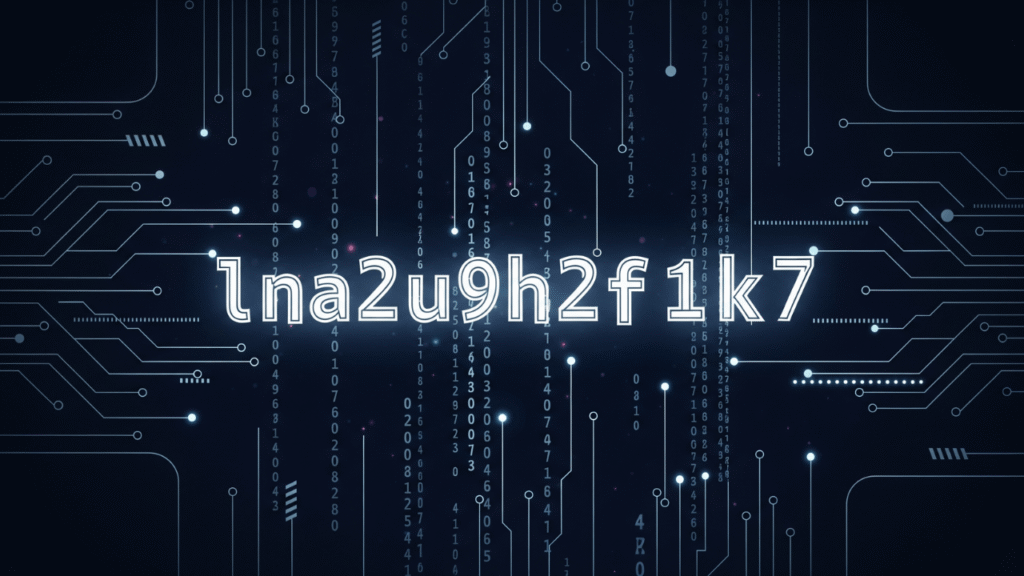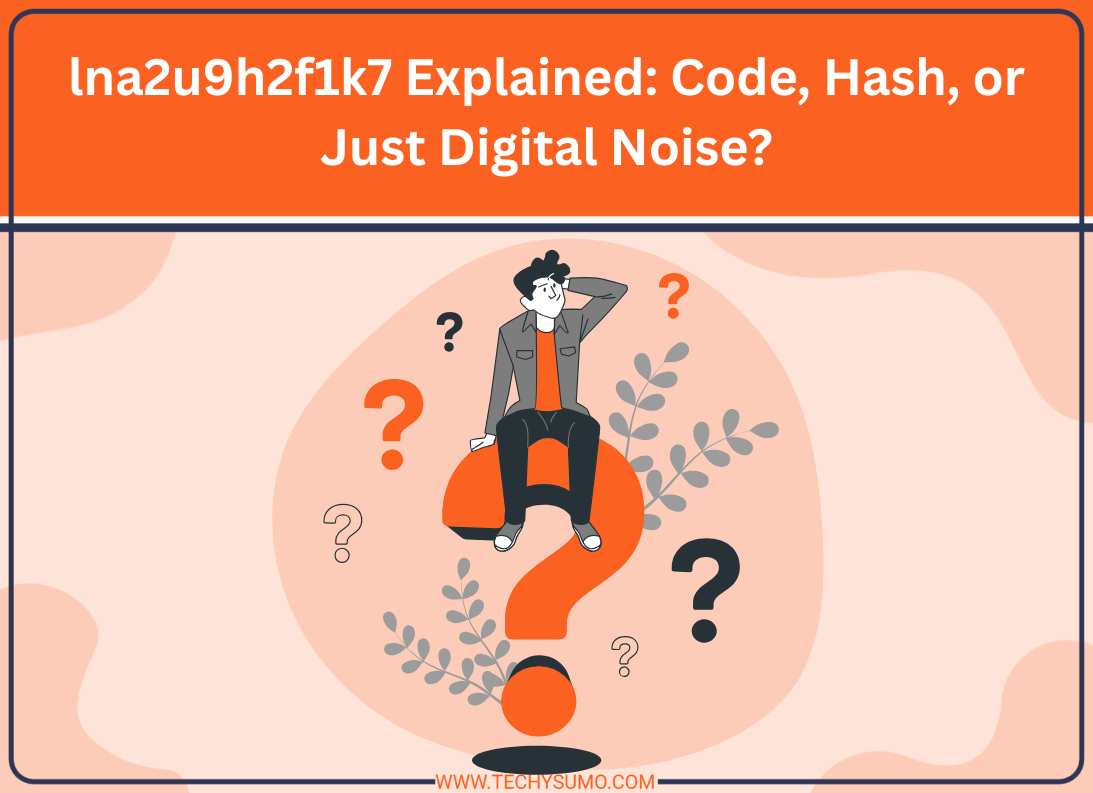Ever stumbled across the strange-looking code “lna2u9h2f1k7” online and wondered, what on earth is this supposed to mean? At first glance, it looks like a password that someone forgot to hide, or maybe even an error message straight out of a system log. But dig a little deeper, and you’ll find that this cryptic string is stirring curiosity everywhere. Is it a file hash? A game redemption code? Or maybe just a meaningless jumble crafted to lure clicks?
Let’s break it down.
Table of Contents
- What is lna2u9h2f1k7? A Mystery Wrapped in Characters
- Quick Meanings That Might Fit the Bill
- The Cybersecurity Angle: lna2u9h2f1k7 as a File Hash
- Data and Communication: The Identifier Theory
- Speculation Zone: Gaming and Marketing
- Risks of Chasing Unknown Codes(lna2u9h2f1k7)
- Best Practices for Staying Safe
- Conclusion: A Code (lna2u9h2f1k7) Without a Clear Answer
- FAQ: lna2u9h2f1k7
What is lna2u9h2f1k7? A Mystery Wrapped in Characters

On the surface, It is nothing more than an alphanumeric sequence—letters and numbers mashed together. But here’s the catch: in the digital world, random-looking strings usually aren’t so random. They’re often used as unique identifiers, security keys, or data markers that hold real purpose behind the chaos.
So while no official explanation exists, its structure hints at a few possibilities. Some say it’s a file hash. Others think it’s a user ID, redemption code, or marketing keyword. Each theory has some legs, and we’ll walk through them all.
Quick Meanings That Might Fit the Bill
Here’s what it could be:
Also Read
- File Hash – a digital fingerprint to verify a file’s authenticity.
- Data Identifier – a unique key for databases or APIs.
- Redemption Code – the kind gamers chase for freebies.
- SEO Keyword – a term invented to draw clicks.
Sound vague? That’s the point. Strings like these usually don’t get explained unless you’re behind the scenes.
While exploring the details of lna2u9h2f1k7, you may also find it useful to check out our in-depth guide on Thejavasea.me Leaks AIO-TLP: A Deep Look at Its Digital Fallout. This article takes a closer look at how large-scale leaks can impact digital ecosystems, user security, and the overall trust in online platforms — a topic closely connected to the discussion here.
The Cybersecurity Angle: lna2u9h2f1k7 as a File Hash
One of the strongest theories is that This Code is a file hash. Think of a hash as a digital fingerprint—completely unique to a file. Even if you tweak just one letter inside a document, the resulting hash changes entirely. That’s why hashes are so useful: they prove whether a file is clean, unmodified, or compromised.
How Do File Hashes Work?
Hashes are generated using algorithms like MD5, SHA-1, or SHA-256. Developers often publish a program’s official hash so users can verify downloads. If your version of the file matches the hash, you know it hasn’t been tampered with.
Real-World Uses in Security
File hashes play a critical role in today’s digital safety:
- Malware Detection – Antivirus software flags known threats by matching file hashes.
- Digital Forensics – Investigators use hashes to prove digital evidence hasn’t been altered.
- Cloud Storage – Services use hashes to spot duplicate files and save space.
If lna2u9h2f1k7 is indeed a hash, it could belong to anything: a clean app, a malware sample, or even some long-forgotten file floating around the web.
Data and Communication: The Identifier Theory
Outside of cybersecurity, unique strings like lna2u9h2f1k7 often function as identifiers.
Databases and APIs
Every user, product, or transaction in a database needs a unique label. Sure, numbers work—but random alphanumeric strings like this are harder to guess and safer to use. This code could easily represent a transaction ID, user session key, or even an API token.
Secure Messaging
In encrypted communication, identifiers help systems recognize each other and establish trust. A string like lna2u9h2f1k7 might live deep inside a secure handshake process, unseen by users—surfacing only when logs or data dumps make it public.
So, in short, this might be nothing more than a digital breadcrumb left behind by software doing its job.
Speculation Zone: Gaming and Marketing
Not all theories are technical. The internet loves to speculate, and that’s where things get interesting.
A Secret Game Code?
Many believe lna2u9h2f1k7 is a hidden redeem code for popular games like PUBG or Free Fire. Gamers know the drill—codes like these often unlock skins, coins, or special items. But here’s the problem: there’s zero official confirmation. Most of these rumors circulate on unofficial blogs looking to cash in on clicks.
SEO Bait and Click Traffic
Here’s another take: maybe lna2u9h2f1k7 doesn’t mean anything at all. It could just be a made-up SEO keyword. Some sites invent strange codes and build content around them to grab curious search traffic. If you searched this code and landed here—well, you see how that works.
Risks of Chasing Unknown Codes(lna2u9h2f1k7)
If there’s one thing the internet has taught us, it’s this: curiosity can be dangerous. Codes like lna2u9h2f1k7 might look harmless, but scammers love to exploit them.
The Dangers
- Phishing Traps – Fake sites may lure you in with promises of rewards.
- Malware Downloads – Clicking the wrong link could drop spyware on your system.
- Survey Scams – “Enter this code for a prize!” is often just a trick to harvest your personal info.
Best Practices for Staying Safe
When faced with mystery codes like this, treat them cautiously:
- Verify Sources – Stick to official game sites, developer announcements, or trusted platforms.
- Don’t Enter Codes on Third-Party Pages – Especially if they ask for logins or personal details.
- Use Security Tools – Antivirus scans or services like VirusTotal can check suspicious files.
- Be Skeptical of Big Promises – If it sounds too good to be true, it almost always is.
Conclusion: A Code (lna2u9h2f1k7) Without a Clear Answer
At the end of the day, lna2u9h2f1k7 might be something big—or it might be nothing at all. It could be a hash from a forgotten file, a token buried in a database, or just a random sequence invented for clicks. Until someone authoritative steps in, it remains a digital enigma.
But here’s the bigger lesson: the internet is filled with codes, keys, and identifiers you’ll never fully understand. The smart move isn’t always to solve the mystery—it’s to protect yourself while exploring it.
So the next time you see something like lna2u9h2f1k7, remember: not every mystery is worth chasing, but every click is worth second-guessing.
FAQ: lna2u9h2f1k7
Q1: Is this a game redemption code?
Not officially. While some blogs claim it is, no game developer has confirmed it as a valid redeem code.
Q2: Could it be a file hash?
Yes, that’s a strong possibility. It matches the structure of cryptographic hashes often used to identify files.
Q3: Is it safe to use or enter this code?
Only if it’s from an official source. Never enter unknown codes on random websites—they could be scams.
Q4: Why do I see this code on different blogs?
Many sites use it as an SEO keyword to attract search traffic, even without knowing its true meaning.
Q5: How should I handle mysterious codes like this?
Stay cautious: verify sources, avoid third-party pages, and run security checks if files are involved.






